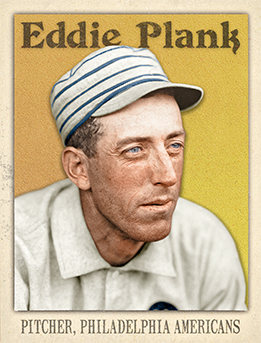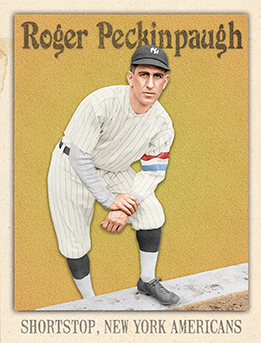
- Series: Diamond Heads '15
- City: New York
- Team: Yankees
- League: American League
Roger Thorpe Peckinpaugh (1891-1977) caught the eye of Nap Lajoie who signed the 19-year old to a pro contract in 1911 with Cleveland. The Naps quickly regretted sending the budding star to the Yankees in 1913, where Roger immediately impressed with his defensive skills at short (best arm of his era) and leadership qualities. Frank Chance made him captain the following year and, upon Chance’s resignation late in the season, Peckinpaugh became the youngest manager in MLB history. NY hired another to manage in ‘15, but Roger would remain captain his entire tenure with the Yankees, which culminated in a World Series appearance in 1921. That proved a fateful Fall Classic for the veteran shortstop. He set a record with nine assists in one game, but his failure to corral a first-inning grounder in the deciding game allowed the only run to score. Peckinpaugh would be traded to Boston that offseason. Far from through, Roger would win a Series with the Senators in ‘24 and then play the goat once more as Washington dropped the 1925 Series. He was honored that year as the first SS named MVP. The League Awards had replaced the Chalmers Award in 1922.
- Became Cleveland’s manager in 1927, returned in ‘41 and later stepped up to GM
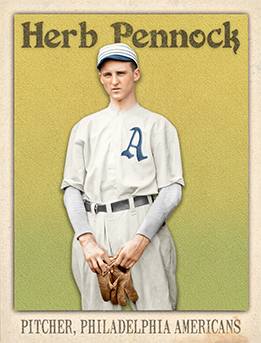
- Series: Diamond Heads '15
- City: Philadelphia
- Team: Athletics (AL)
- League: American League
- Hall: National Baseball Hall of Fame
Herbert Jefferis Pennock (1894-1948) was one of the premier left-handers in baseball history, winning 240 games and helping the Yankees to four pennants from 1923-32. Connie Mack rued the day he let Pennock go to Boston in 1915, giving up on a talent that would result in a plaque at Cooperstown. The Sox, too, gave up on Herb, sending him as the last of the out-migration (11 starters) from Boston to New York in 1923. An immediate hit in the new stadium in the Bronx, Pennock’s easy-going manner and slow curves kept his team relaxed. He rarely faced the aces of his era but was used in tough spots and key match-ups. Pennock excelled under the pressure of World Series in the Big Apple. In perhaps his finest moment, Herb clinched NY’s first title in ‘23 on one day’s rest; an effort renowned umpire Billy Evans called “the greatest pitching performance I have ever seen.” More October glory would follow including decisive saves in his finale against the Cubs in ‘32.
- Pennock went on to a front-office career, ending with the Phillies in ‘47. He closed his tenure in infamy as he fought Branch Rickey bitterly to keep Jackie Robinson out of Philadelphia
- Elected to Hall of Fame: 1948
- Series: Diamond Heads '15
- City: Philadelphia
- Team: Athletics (AL)
- League: American League
- Hall: National Baseball Hall of Fame
Edward Stewart Plank (1875-1926) hurled more shutouts and complete games than any other lefthander in his 17-season career. He ranks behind only Warren Spahn and Steve Carlton among southpaws in wins. Signed by Connie Mack straight out of college, Plank never played a day in the minors. Playing in 4 Series for Philadelphia, Plank had an ERA of 1.32 but got no run support, going 2-5 but finishing all six of his starts.
- His 326 wins ranks 13th on the all time list. He had eight 20-win seasons
- At the end of his career, played for St. Louis in the Federal League’s final year in 1915 and then with the Browns for two more
- Elected to Hall of Fame: 1946
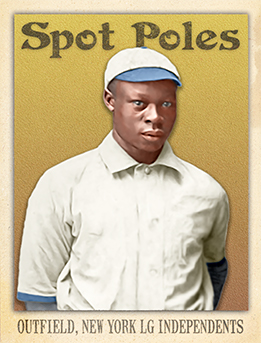
- Series: Diamond Heads '15
- City: New York
- Team: Lincoln Giants
- League: Independent
Spottswood Poles (1889-1962) was ranked by renowned athlete and singer Paul Robeson as one of the four most talented black athletes of the first half of the 20th century, along with Jesse Owens, Joe Louis and Jack Johnson. Fast company for a fleet-footed outfielder who was once timed in a sub-ten-second 100 yard dash. Spot was raised in Harrisburg, PA and came up with the sports clubs for colored kids. His talent led him to debut with Sol White's Philadelphia Giants in 1909. He was a hit. And could he hit: averaging well over .400 for four seasons. He followed his mentor to New York's Lincoln Giants and remained with various NY clubs until returning to Philly and Ed Bolden's Hilldale Club. Some highlights of his time with the Lincolns included defeating Rube Foster's powerhouse Chicago American Giants and proving his mettle against all competition, including getting three straight hits off Grover Cleveland Alexander in one of the exhibition games played against major league teams. Spot enlisted with the 369th Infantry Regiment, dubbed by their German foes the Hellfighter Regiment for their implacable defense (never giving up a trench or a yard of battlefield), and earned five battle stars and a Purple Heart. The 369th was the first African American unit in WWI and was assigned to the French forces who knew them as “The Men of Bronze”. They called themselves the Harlem Hellfighters. After the war, Poles knocked around before settling back with Hilldale.
- Playing in Cuban and Negro ball, Poles is cited in some sources as averaging over .400 lifetime, a stat not corroborated by Baseball Encyclopedia. Suffice to say, he was one of the best hitters of his or any era
- John McGraw pegged Spot as one of four black players he'd have put in the majors, with Pop Lloyd, Smokey Joe Williams and Cannonball Dick Redding
- The decorated war hero is buried in Arlington National Cemetery with his wife Bertha
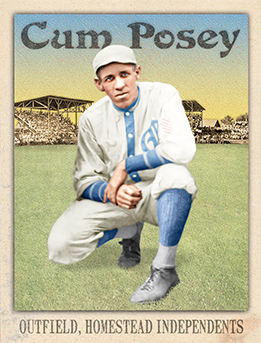
- Series: Diamond Heads '15
- City: Homestead
- Team: Grays (IND)
- League: Independent
- Hall: National Baseball Hall of Fame
Cumberland Willis Posey Jr, (1890-1946) was a brilliant, gifted and driven man, on the basketball court, the boxing ring, the diamond and the front office. He starred as Penn State’s first black hoops player, played at Pitt and Duquesne before founding his Black Five entry where the team won four straight Colored Basketball World Championships. He was an owner and columnist for the Pittsburgh Courier, managed a boxing team and, by the way, built the Homestead Grays into one of the dominant franchises in Negro League history. Posey wasn’t big (5’9” and 145 lbs) but he excelled at every sport he tried. Yet, it was as player/manager/executive of the Grays from 1911 to 1946 that Cum made an indelible mark on American sports. Eleven of the 18 Negro League-era players in the Hall of Fame when Posey was inducted had played for him at some point. He had an unerring eye for talent and recruited the best, even in the face of fierce competition.
- Posey’s Grays had been a force in Negro ball through the ‘20s and 30’s but never more so than during their unparalleled surge to nine straight league championships, a string that ended with this remarkable man’s untimely death from lung cancer on the very eve of Jackie Robinson’s matriculation
- Elected to Hall of Fame: 2006
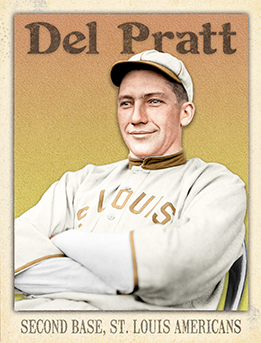
- Series: Diamond Heads '15
- City: St. Louis
- Team: Browns (AL)
- League: American League
Derrill Burnham Pratt (1888-1977) played for the Browns, Yankees, Red Sox and Tigers over a 13-year career in the majors. The scion of a cotton-mill dynasty, Pratt studied the family business at the University of Alabama while pursuing his first love, baseball. He excelled with ‘Bama in both football and baseball to the extent he was inducted into the school’s Sports Hall of Fame. Del entered minor-league ball in 1910 and showed himself to be an outstanding hitter. St. Louis signed him and held on against John McGraw’s efforts to lure him to the Giants. He rewarded the Browns with five great years where Pratt was the everyday second-baseman consistently batting near .300. Perhaps befitting one who was to the manor born, Pratt was a fighter. He became a union leader in the tumult of the Federal League era, had some fistfights with rowdy opponents, and generally stood his ground. Branch Rickey admired his feisty infielder but lost his managerial job when the Browns were sold in 1916. Del ran afoul of the new owner and was traded to NY where Miller Huggins would say Pratt “put the ball club on its feet.”
- Long before the vaunted ‘27 club, sportswriters dubbed the infield Pratt joined as “Murderers’ Row,” the “greatest collection of pitcher thumpers in baseball today.”
- During Pratt’s career, from 1912-1924, Pratt was 12th in all of baseball in WAR (between Max Carey and Home Run Baker)


